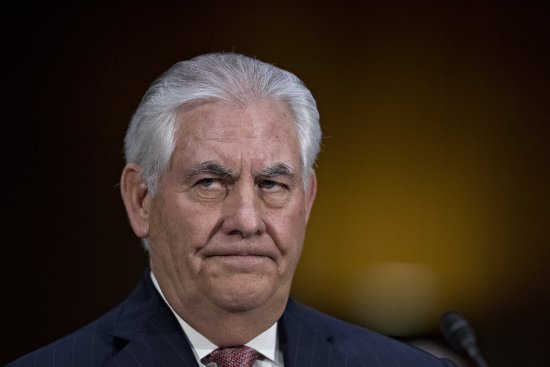
With or without Secretary of State Rex Tillerson
U.S. Secretary of State Rex Tillerson seems intent on hollowing out the U.S. diplomatic corps. More than 100 senior Foreign Service officers have reportedly left the State Department since January, some of them forced out, while others are simply frustrated by Tillerson’s lack of engagement with senior staff. Rumors have already begun to surface that Tillerson may be replaced by current CIA Director Mike Pompeo (though they were swiftly denied by President Trump).
For anyone who believes that diplomats can help avoid or limit conflict, these recent State Department developments are bad news. Here are five places where, under better circumstances, U.S. diplomats might make a difference.
Syria
Six years into its civil war, Syria remains the world’s messiest geopolitical disaster zone. No amount of U.S. diplomatic power could have prevented the country’s descent into violence, given the kaleidoscope of different actors and interests involved. But as the war on ISIS winds down, the fact remains that there aren’t nearly enough U.S. diplomats engaged in talks to ensure Washington has real influence in determining an eventual political solution in Syria.
In fact, Russia is leading the diplomatic track while the U.S. watches from afar. Russia insists that its ally Bashar Assad remain in power, which assures Moscow’s continued access to the Tartus port in Syria (Russia’s only port on the Mediterranean Sea) and bolsters Russia’s image as a player on the world stage. With a less-than-robust U.S. diplomatic presence at the negotiation table, Moscow is on track to get the outcome it wants.
Iran
Candidate Donald Trump repeatedly railed against the Iran nuclear deal, calling it a “disaster, in virtually every way.” It took Trump nearly 9 months, but he finally opted not to “recertify” Iran’s compliance with the deal in October, a symbolic move that does little beyond forcing Congress to contemplate re-imposing economic sanctions against Tehran. But looking beyond the nuclear deal, the Trump administration has repeatedly failed to flesh out a comprehensive pushback policy against Iran in the region (see Syria, above), and that’s in large part due to lack of staffing.
While Trump may want more sanctions, the U.S. must walk a fine line and avoid violating the terms of the nuclear deal that other signatories (China, France, Russia, the U.K. and the E.U.) want to adhere to—a move the PR-fixated Trump knows will paint Americans as the bad guys. One way around that would be to win the support of deeply skeptical Europeans to back a nuclear deal renegotiation, a tall order under the best of circumstances. But Trump would have to send diplomats across Europe to make Washington’s case. The State Department isn’t currently staffed to do that.
North Korea
If there’s one area that might immediately benefit from the intervention of cool diplomatic heads, it’s on the Korean Peninsula, where U.S. allies (South Korea and Japan), rivals (China and Russia), and one huge headache (North Korea) are at odds. Russia, China, and South Korea now argue that the only viable way to reduce long-term tensions with North Korea is to pursue a negotiated solution to the standoff—one that will require patience, imagination, and sound judgment.
Though the U.S. Embassy in Seoul is competently led by Chargé d’Affaires Marc Knapper, and the State Department officials in D.C. who focus on Northeast Asia are top notch, President Trump has yet to name a replacement for ambassador to South Korea Mark Lippert, who stepped down nearly 11 months ago. Former director for Asian affairs at the National Security Council Victor Cha was tapped in August to assume that post, but the confirmation process has not progressed. Trump brushed aside concerns over State Department vacancies during a recent interview by saying, “Let me tell you, the one that matters is me. I’m the only one that matters.”
The Gulf
Diplomacy becomes more difficult when the president unwittingly creates condition for a crisis. Trump’s visit to Saudi Arabia earlier this year encouraged the U.S. ally to lead Egypt and the UAE in an effort to isolate Qatar, home to the region’s largest U.S. military base, over its support for the Muslim Brotherhood in other countries. While Tillerson and Defense Secretary James Mattis tried to tone down tensions in the immediate wake of the Qatar blockade, Trump added fuel to the fire by applauding Riyadh’s bold move on Twitter.
The Qatar story has momentarily taken a backseat to the purge being carried out in Riyadh by crown prince and soon-to-be Saudi king Mohammed bin Salman, but given the lack of clarity in the U.S. diplomatic stance and lack of diplomatic numbers, the gap between Qatar and the Saudis is unlikely to narrow.
Zimbabwe
President Robert Mugabe’s recent ouster heralds a new era for Zimbabwe. His successor (and former vice president) Emmerson Mnangagwa will still preside over a militarized autocracy, but one that could do more than Mugabe has done lately to ease economic misery for Zimbabwe’s people. That would be an improvement, which says plenty about today’s Zimbabwe. Historically, the U.S. had played a critical role in leading Western-backed sanctions against the Mugabe regime; as a result, China has become the country’s strongest ally outside Africa. Mnangagwa, who got his military training in China half a century ago, visited that country shortly before the intervention against Mugabe began last month.
For a Trump administration worried over China’s expanding influence, having only an “acting” Assistant Secretary of State for African Affairs hamstrings Washington’s ability to revitalize relations with the new government. Greater U.S. influence with Mnangagwa will also depend on improved ties with the South African government — but the Trump Administration has yet to nominate an ambassador to that country, either.